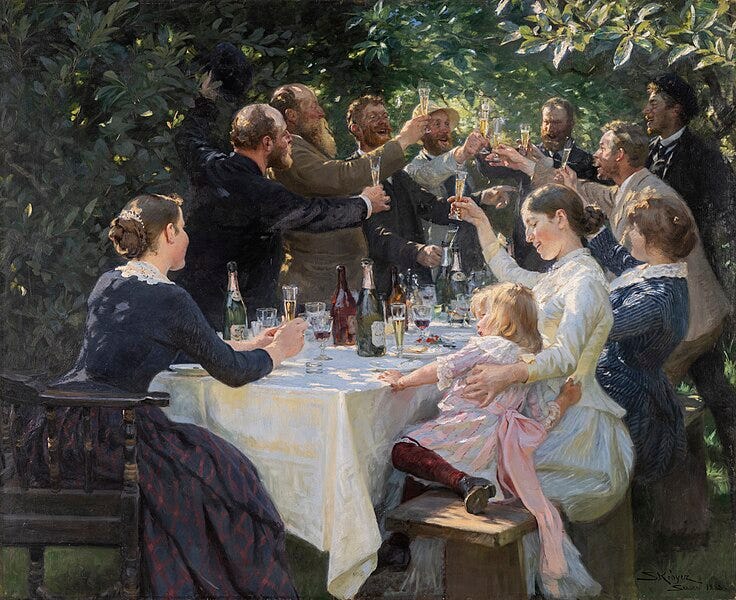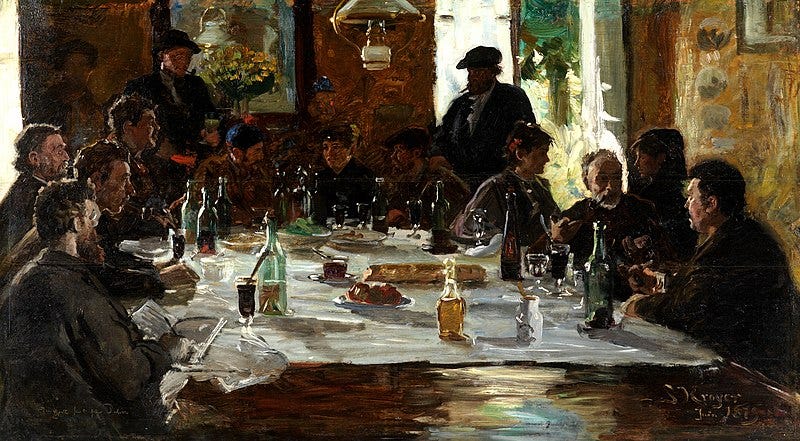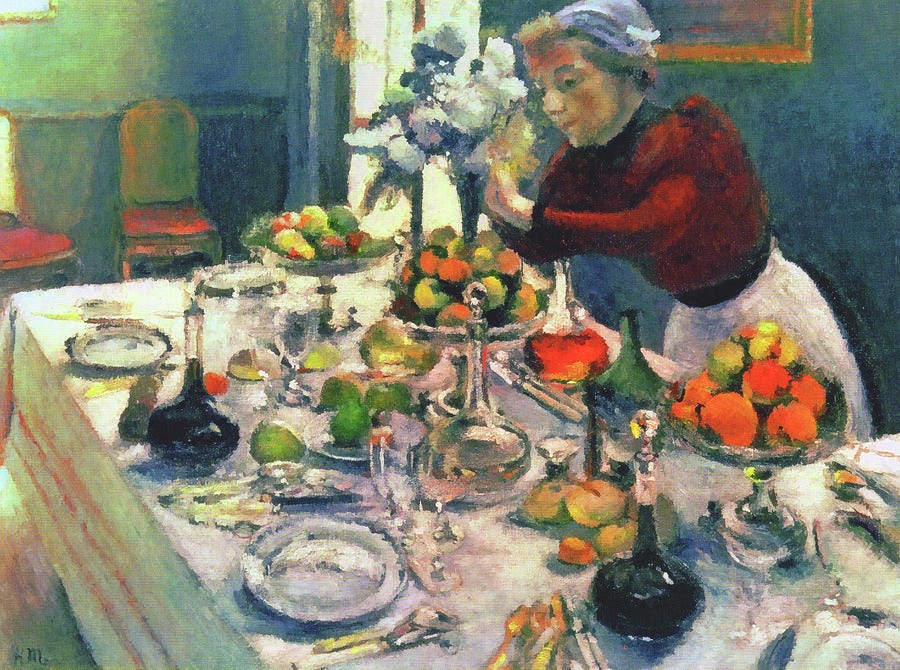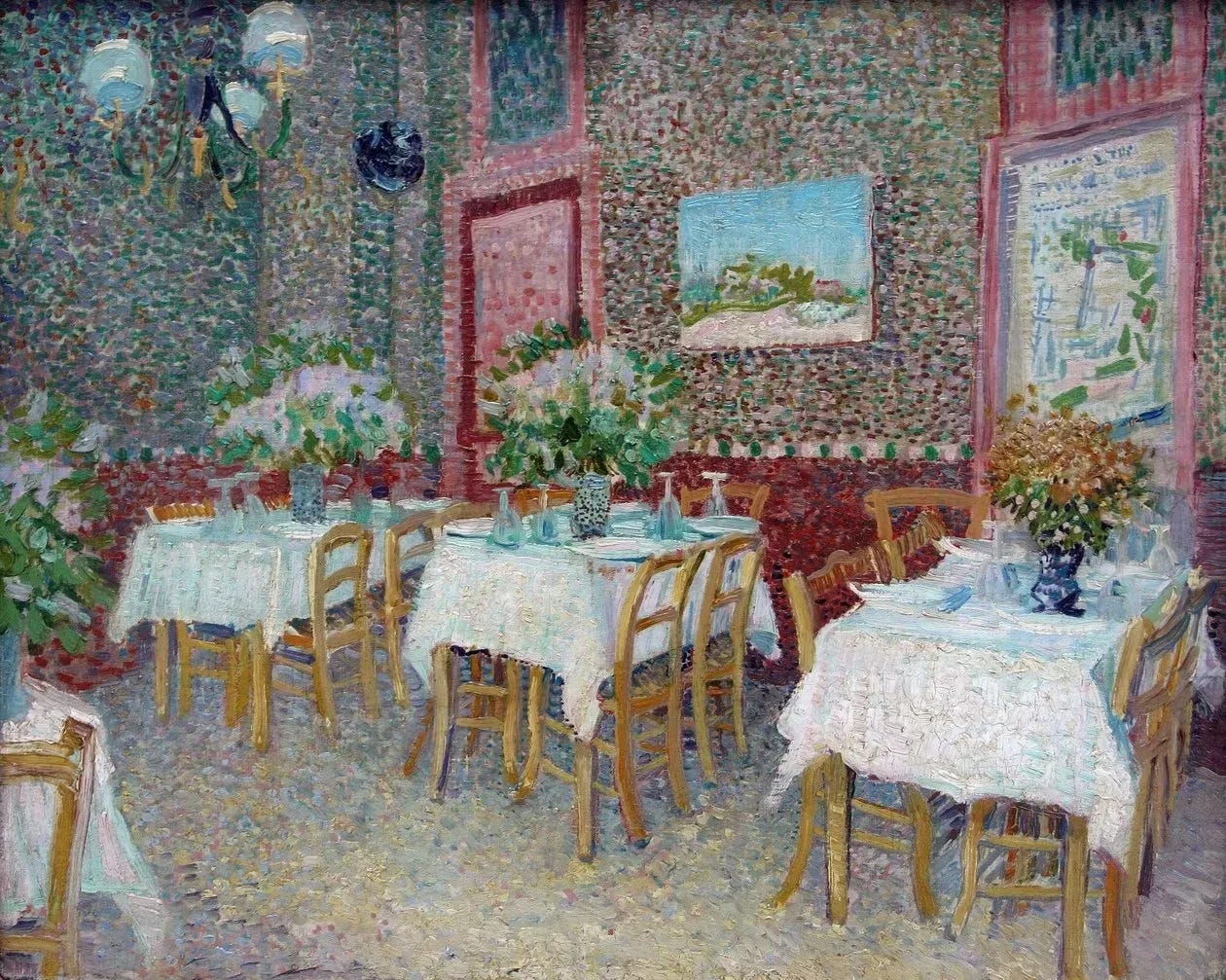The Convivial Quest: The Importance of Being Festive
A table, feasting and fasting, community snapshots, and a practical beginning
“If more of us valued food and cheer and song above hoarded gold, it would be a merrier world.” - J.R.R. Tolkien
We think a lot about the little rectangle of plastic and glass we carry with us everywhere, yet we take for granted that other rectangle which hovers three feet off the floor, balanced on four legs, built of wood and screws. Most tables are humble pieces of furniture, yet often they are places where history is made.
In our home, the table where we eat our meals is also the table where all of our kids did their homeschool lessons. It’s a table of feasting and learning, a table that’s seen us debating everything from Covid to free will, a table where we’ve cried and prayed, a table where we’ve played games and kneaded bread. The scuff marks and scratches on our wooden table, and the tiny crumbs of food trapped between its panels, will be one of the major fossil records of our family’s existence.
Then, suddenly, we needed another table. There were various reasons, one of which was the decision that we were going to Organize Conversations for Groups of People About Important Things, and we needed a much bigger table for that.
Great quests often begin around a table, where companions can talk and eat before setting out on the journey. In our case, we weren’t exactly sure about the nature of the quest, other than to Organize Conversations About Important Things, so we figured we’d get the big table first, and then add the food and the people, and see what happened.
One of us (Peco) stipulated that the table be big enough for thirteen dwarves and a wizard (in honour of the The Hobbit). The other of us (Ruth) wanted one that—in memory of her football-loving father—was big enough to seat at least a German soccer team. To our dismay, good tables are expensive, and the not-so-good ones are small and cheaply made—the kind that would easily crack under the hammering fist of a jolly dwarf or German footballer.
Much to our delight we chanced upon a used Mennonite-made marvel that expands with a masterfully crafted cog mechanism to accommodate 18 people. To this we added our garden table, smaller kitchen table, and lots of stools and folding chairs which expanded our hosting capacity to 30 guests.
We held our inaugural gathering last week, combing the celebration of three birthdays and A Christmas Carol reading with a splendid potluck feast. The ages ranged from five to over eighty and as we observed interactions and the clusters of lively conversations, we were reminded of a swoop of swallows coming together, changing direction, and reforming into new groups. Although we’d love to share the splendid Christmas Carol reading which was presented by parents and kids with comic voice acting and great improvisational tone, we are happy to report that there is no recording of it whatsoever. There was no official rule around phone use for the evening, but we all were simply so engaged that phones were rendered irrelevant.
When a group of teens with one guitar and a few pages of music broke into a resonant Auld Lang Syne and lusty Joy to the World, it cracked parents’ hearts and left us with a conviction that gatherings like these are what build hope in our future.
A couple of months ago,
and her husband Patrick hosted the “Meaning vs. The Machine” conference in the Catskill mountains which described as an “extended salon” consisting of “a loose association of writers, builders, farmers, and activists concerned about the state of America in the Machine Age who are thinking creatively about how to live within it.”1The gathering sparked not only “bombshell” conversations, but also stirred up energy around creating regular meeting spaces for discussion and conviviality. The great news is that, while it is a special opportunity to have speakers such as
, , or attending an event, any of us can decide to host such feasts infused with lively conversation simply by opening the doors to our homes.Just as we can take steps to prepare for the collapse of knowledge, reclaim our attention by practicing digital fasts, restore our minds by joining the “tech-naked” Walking Rebellion, each of us can also actively participate in building seedbeds for community. Today we’ll explore why celebration is central to a quest for conviviality and share practical ideas for hosting gatherings and examples of vibrant communities.
Feasting, fasting, and what is worth celebrating
“All true friendliness begins with fire and food and drink and the recognition of rain or frost. ...Each human soul has in a sense to enact for itself the gigantic humility of the Incarnation. Every man must descend into the flesh to meet mankind.”
from What’s Wrong With the World by G.K. Chesterton
Years ago when I (Peco) was in school, there was a joke among the students that if we were ever asked to describe one of our weaknesses in an interview, the answer should be “I work too hard”.
It’s natural for students to see school, work and jobs as all examples of toil. But surprisingly, the main meaning of the word school in ancient Greek (σχολή or skholḗ) isn’t school or even work, but leisure, free time, and rest. Which suggests we can’t properly learn unless we can experience a state of leisure.
It can be hard to get our heads around that. I still struggle with it. I often fall into the habit of thinking that the central purpose of my leisure time is to help me rest and refresh myself, so that I can be more effective when I get back to work. But according to Joseph Pieper, this is backwards. To see life in this way is to reaffirm that life is really just about work.
According to Pieper, we can’t be fully human unless we can experience leisure. Pieper even argues that leisure is the basis of culture. We aren’t meant only to work, to be utilitarian or functionaries at a job. More fundamentally, we must be capable of a free and unfettered mode of being, one that possesses both the power of contemplative absorption and a soaring spirit.
To be fully human is to be capable both of prayer and dance, of silence and celebration.
There are many kinds of leisure, and one of the most common are parties, festivals, feastings, all things convivial. Of these, there are more subcategories, yet there’s a spiritual thread that arguably separates them all into one of two types. In the Will to Power, Nietzsche describes one of these types like this:
Feasts include: pride, exuberance, wantonness; mockery of everything serious and Philistine; a divine affirmation of oneself out of animal plenitude and perfection—one and all states which the Christian cannot honestly welcome. The feast is paganism par excellence.
This definition of the feast was penned over 100 years ago, yet it still expresses modernity’s vision of celebration: me, my appetites and desires must be affirmed above all else.
But why would Nietzsche consider this affirmation divine?
Partly because, when we activate our desires deeply enough, whether through emotional highs or intoxicating highs, we encourage an intense altered mental state that can make it seem as if we’re transcending ordinary life. Modernity’s parties are forms of secular enchantment.
In fact, the enchantment isn’t actually secular. It really is “paganism par excellence”. The Vikings expressed it in their belief in Valhalla, the great afterlife where dead warriors dwell in a vast hall, feasting, getting drunk, being waited on by beautiful Valkyries, and fighting to the death—only to be magically healed by the end of the day and do it all over again.
Nietzsche didn’t think the Christian “could honestly welcome” the celebratory bravado of the pagan, which is probably true. But he also misses something essential. Christianity doesn’t deny feasting, yet it doesn’t deny it’s opposite either—asceticism, self-denial, and fasting. In The Feasts and the Ascetic, G.K. Chesterton observes:
When somebody says that a fast is the opposite to a feast, and yet both seem to be sacred to us, some of us will always be moved merely to say, "Yes," and relapse into an objectionable grin.
When the anxious ethical enquirer says, "Christmas is devoted to merry-making, to eating meat and drinking wine, and yet you encourage this pagan and materialistic enjoyment," you or I will be tempted to say, "Quite right, my boy," and leave it at that.
When he then says, looking even more worried, "Yet you admire men for fasting in caves and deserts and denying themselves ordinary pleasures; you are clearly committed, like the Buddhists, to the opposite or ascetic principle," we shall be similarly inspired to say, "Quite correct, old bean," or "Got it first time, old top," and merely propose an adjournment for convivial refreshment.
Feasting and fasting, festive joy and solitary prayer, might seem like opposites, yet they are two ways of responding to the same spiritual reality. Both are visible in good liturgical structures, like the divine liturgy of St. John Chrysostom, where almost every word of the service is beautifully sung, so it’s almost impossible to say whether you are praying to God or celebrating, since both are happening simultaneously.
Feasting and fasting, celebration and prayer, don’t negate each other but complete each other—at least from the perspective of the Christian worldview. And this is true not just in formal religious worship, but in life more broadly.
The error of modernity is that it wants the feasting and festivity, but not the fasting and prayer. Yet all these opposites are a part of “leisure”, and they all connect us to something greater.
More from Pieper:
Now the highest form of affirmation is the festival; among its characteristics…is ‘the union of tranquility, contemplation, and intensity of life.’ To hold a celebration means to affirm the basic meaningfulness of the universe and a sense of oneness with it, of inclusion within it. In celebrating, in holding festivals upon occasion, man experiences the world in an aspect other than the everyday one.
To describe a festival as involving a “union of tranquility, contemplation, and intensity of life” sounds more like an individual experience of intense prayer. It suggests, again, the marriage of opposites—festivity and prayer, feasting and fasting—yet it also suggests these connect us to something otherworldly.
When we pray, we open ourselves up to deeper realities. That may seem obvious, yet less obvious is that the same thing happens during celebration.
At a celebration we might drink wine or beer, or dance, or sing songs. But who are we drinking to? Who are we dancing for? Who are we singing for? We might think we’re doing it for ourselves, or the people immediately around us.
Yet the way we answer these questions isn’t only a matter of personal preference and social forces. Our answers are also shaped by how we think about ultimate Reality. Our spiritual views, if they’re truly wholistic and form the basic standpoint of our lives, really will influence everything we do.
More than that, whether by the power of the music and dance, the quantities of food and drink, conversation, or some other festive stimulus, we tend to lower our inhibitions during celebrations, relax our defenses, open ourselves up, allow ourselves to be different, which is what alters and intensifies our experience into something out of the ordinary. It’s what makes celebrations enchanting. Yet not every celebration summons the same enchantment, and not every enchantment is good for the soul.
Our culture is constantly encouraging us to celebrate one thing or another. If we don’t seek out our own answers about what’s worth celebrating, then the answers will be supplied by outside interests, corporate, political, or otherwise. If celebration is a form of enchantment, then those who manage the enchantment will wield influence over the deepest layers of our spirit.
We can refuse these unwanted intrusions. We can set aside the little rectangles of plastic and glass that are forever trying to cast their spells on us, and set up our big wooden rectangles to lay out the food for our own celebrations—and in a world of increasing upheaval, we might want to put as much care into our celebrations as we do in our prayers.
The people we invite to our feast tables, the songs we sing together, the animated conversations about our lives and the state of our world, aren’t just transient experiences of convivial togetherness. They can deepen our relationships with each other, with our spiritual faith, and give us courage on our quest into the future, wherever it may lead.
Snapshots of convivial gatherings
A few weeks ago I (Ruth) shared a note about IRL “offline clubs” happening in Amsterdam: 250 people “dumped their phone” to hang out at a church to read, paint, play, and “Digital detox cafes” are the new cool hangout spot. I invited readers to share practical ways that they make convivial communities happen, however small or large and it whatever form.
The responses included a great variety of gatherings, each reflecting the particular gifts and interests of the people who arranged the meetings:
commented:also offers a free pdf guide to hosting “liturgical gatherings that weave your unique place & people into the Church year” which you can access as a free subscriber here. Also see her Liturgical Life Groups section. is a veteran organizer of lively gatherings:…I’ve hosted a liturgical living group for several years - and forming it was really an answer to the dislocation I felt in our modern world. People aren’t “joiners” anymore, and so social clubs are perishing across the board. Trying to find a way to enter into community in our age can at times feel so stilted!
So, I went out on a limb several years ago and approached a few friends about liturgical gatherings. I’ve learned a LOT since then - I had to let go of my unhealthy tendency for perfectionism (and stop trying to control and curate!), and I’ve also learned that the more broad a group can be, the more it can truly reflect our actual community…full of people with whom we might not feel we have much in common, rather than just a siloed group of people who fit whatever rubrics resonate with our personality. If I had only sought out the folks who I had thought were interested in liturgical living, I would have severely misjudged and limited so many of our community members - many of whom have arrived through common connections, but who had no specific interest in liturgical living at the start! (I’m reminded of Medieval mystery plays…)
Our group is now at the point where we meet regularly once each month. We always share a meal, but our activities and focus varies month-to-month. We started with a handful of folks, most with no background in the liturgical year, and in our most well-attended gatherings, we sometimes have around 40 folks (including kids of all ages). Attendees are always encouraged to bring guests - they’ve brought in-laws and grandparents, friends and visiting relatives.
found a creative way to accommodate large groups:The first and possibly best was The Vinyl Club, where friends all spent one Sunday afternoon a month playing strictly only vinyl records that we had brought along. We took turns, answering one record with another, in a beautiful ongoing conversation of sound and lyric. We’d introduce each record with what it meant to us, or where we had first heard it. There was also a cocktail of the day, for those who liked a tipple, as well as the usual tea and coffee. No phones, no CDs, no TV, no computers, just that warm crackle of the lead-in track and the arm of the turntable going ‘click’. A joy. We shall be reinstating it next year with my partner’s eclectic LP collection and record player.
has hosted an “open invite dinner” on most weeks for the last eight years!We’ve rented our local village hall one Sunday afternoon every month and issued an open invite. No one here has a home or garden big enough to accommodate large crowds (especially with lots of small kids.) The hall has a kitchen and playground nearby, so people bring food and then when the kids start to get itchy they can run wild. Mostly people chat, drink tea, and catch the toddlers from running into the parking lot! (In December we’ll also include an “Advent market” so local makers can sell their wares.) We have a few committed families who ensure that it happens, and then a range who filter in and out.
The only rule is no phones at dinner. Most weeks now we have twenty adults and three to ten children. This past week was 25 adults and 9 children! There’s someone new every week.
We've seen three couples who met at our dinners get married, people looking for work have met people looking to hire, and a number of people have converted (which is all the Holy Spirit, all I do is cook!) We encourage other people to try experiments in hosting!
The imperfect and sometimes chaotic dinners of Mr. Fezziwig or Tintoretto’s Last Supper can still be a delight to guests if they are done with love for other people. That love, manifested in the act of hosting a dinner, is a community-building virtue within your reach.
How About Dinner by Anna Pavlovna
Even with a newborn in the house,
is making plans for monthly gatherings:We prepare a big pot of pasta. The rest is potluck. It will be very free form but invited guests are asked to bring a song, poem, 5 minute polemic, or short story to share. No satanic rectangles allowed. If you want people to sing along with you, you have to bring physical print outs of the songs. If you don’t know the chords and didn’t bring the sheet music, you’re out of luck. We’ve done a variation of this in the past. Community poetry readings with adults and kids. Recite a poem or read your own original work. It has been exceptionally fun.
While
is currently traveling through the U.S. with her husband , she hopes to resume these splendid gatherings:I used to host biweekly or monthly get-togethers at my home — a lot of my guests would drive a couple hours to attend because I was out in the middle of nowhere. Naturally the part would often extend into the next morning as many would be too tired to drive home. There was no booze and no cell phone service. We ate lots and often would knit or embroider (The first couple gatherings were me teaching the girls how to knit and sew, etc). These gatherings were some of the most joyous times of my single days. Once we’re settled I’ll be doing them again.
These started by me going to open mics, various churches, and other events and inviting EVERYONE I met, and then making it a FB event. Eventually people brought their friends. Strangers routinely showed up at these gatherings. It felt like a cozy version of the banquet described in the Bible.
There is no good trying to be more spiritual than God. God never meant man to purely spiritual creature. That is why He uses material things like bread and wine to put the new life into us. We may think this rather crude and unspiritual. God does not: He invented eating. He likes matter. He invented it.
C.S.Lewis
Some practical considerations
There are no set prescriptions for the quest for conviviality. The vision for celebrations and gatherings will take on myriad forms, but here are some practical ingredients for getting started:
food - Prepare a central dish and invite guests to bring along a dish to share (as we were hosting a rather large feast we prepared turkey, ham, and mashed potatoes, and guests supplied the rest).
preparation - If you have children or teens, this is an excellent opportunity to let them choose a dish to prepare, bake a dessert to share, decorate, or set tables.
invite children, teens, adults - The intermingling of ages has a healthy effect of role-modeling at various levels and mirrors true, traditional community.
music - We are fortunate to have talented fiddlers, guitar, cello, flute, and even harp players among our friends, but even simple voices can act as a most wonderful instrument.
reading, drama, poetry etc. - We printed out several scripts of the 40 min read-aloud version2 of A Christmas Carol, which had various roles that were assigned to different readers, resulting in much theatrics and laughter.
conversation corners and big table conversations -Speaking with others in real life, rather than just participating in online discourse, offers an excellent exchange of ideas and viewpoints. For many teens this is a much needed opportunity for interacting with people of various ages.
invite a variety of people (e.g. not everybody from the same church) - Inviting a broad group reflects true community, rather than what describes as “a siloed group of people who fit whatever rubrics resonate with our personality”.
make it a Real Time event - No recordings of the gathering.
make phones irrelevant again - You may want to remind your guests to power off phones, or even leave a “phone deposit” box by the entrance.
Next week we’ll be hosting a Christmas Open House with cookies, coffee, tea, and hot cider for the seniors on our street and have plans for a New Year’s potluck feast.
This is the perfect season to gather, and we invite you to join us in our Convivial Quest by inviting at least one person to join you for a meal over the next month.
To be festive is to be joyfully encouraged in each other and in our hopes; to challenge the Machine’s influence over what is worth celebrating; and to remember that every feast echoes something of the divine.
We often lament how hard it is to find community, but we can all found community. It can begin with a simple table and an invitation, and most importantly, a spirit of conviviality.
Whether it is just gathering with a couple of friends or arranging regular community feasts, we would love to hear from you!
Please share your experience of getting together with people, whether it be 2, 20, or 200. How do you do it?
What practical considerations would you add to the list?
What encouragement can you offer readers who would like to start hosting gatherings?
If you found this post helpful (or hopeful), please consider supporting our work by becoming a paid subscriber, or simply show your appreciation with a like, restack, or share.
Come and join us on A Pilgrimage out of the Machine!
My husband
and I and will be leading an eleven-day pilgrimage on the Camino in Spain next year, from June 14-24, 2025. Space is limited, so reserve your spot now :) You can read all about it here or download the brochure here. We would love for you to join us in visiting historic sites, sharing meals, building relationships, all while hiking through a naturally and spiritually inspiring landscape.Further Reading
Leah Libresco Sargeant provides a “practical handbook” with Building the Benedict Option. See also
’s The Benedict Option: A Strategy for Christians in a Post-Christian Nation
The BenOpWeekend seeks to support people in building faith-centric communities.
Bruderhof communities have settlements around the world including the U.S., U.K., Germany, Austria, Australia, Paraguay, and South Korea. You can read about their experiences at Seasons of Community Living.
L’Abri, which was founded by Francis and Edith Schaeffer in Switzerland, also has locations around the globe and offers individuals “the opportunity to seek answers to honest questions about God and the significance of human life”. They host lunch discussions five times a week! See L’Abri Felllowship: A vulnerable but secure shelter.
- is doing magnificent community building work at the Sand River Community Farm. You can read all about his community soup lunches and various projects to “dientangle food and feeding from the market” at the Peasantry School Newsletter.
Also see
, , and JoyYou can download a free pdf of the complete reading or a 45-min version cotaining Dickens’ original words only (i.e. no simplified language) from my post For the Love of Language: Unlocking Classic Literature with 217 words











Leaving this in my inbox to remind me to share lessons learned after our planned Christmas caroling party later this month!
What a great rundown of ideas for creating intentional community. Where I seem to differ from the norm in these discussions is that I don't really believe in hosting potlucks. I personally love to cook and bake, and happily contribute when I am invited to one, but I have many friends who do not enjoy those activities and I would never want to impose a "chore" on a guest who might enjoy the opportunity to not do the cooking for once. If I need help preparing a spread for a large number of guests, I try to identify one or two willing co-hosts well in advance who can help (I hosted a baby shower this fall and the anticipated baby's grandma split food prep dutiees with me). Of course I always welcome contributions especially of the dessert variety, but I never imply that it's expected. Just my personal hosting preference.
We are hosting a "Twelfth Night" open house this year with some of our more liturgically-minded friends–I realized that all the weekends in December tend to be busy, but the supply of Christmas-y parties dissipates after New Year's– and hope to make this a yearly tradition. I'm hoping to integrate some of the ideas in this post and comments–caroling, read-alouds, and more.